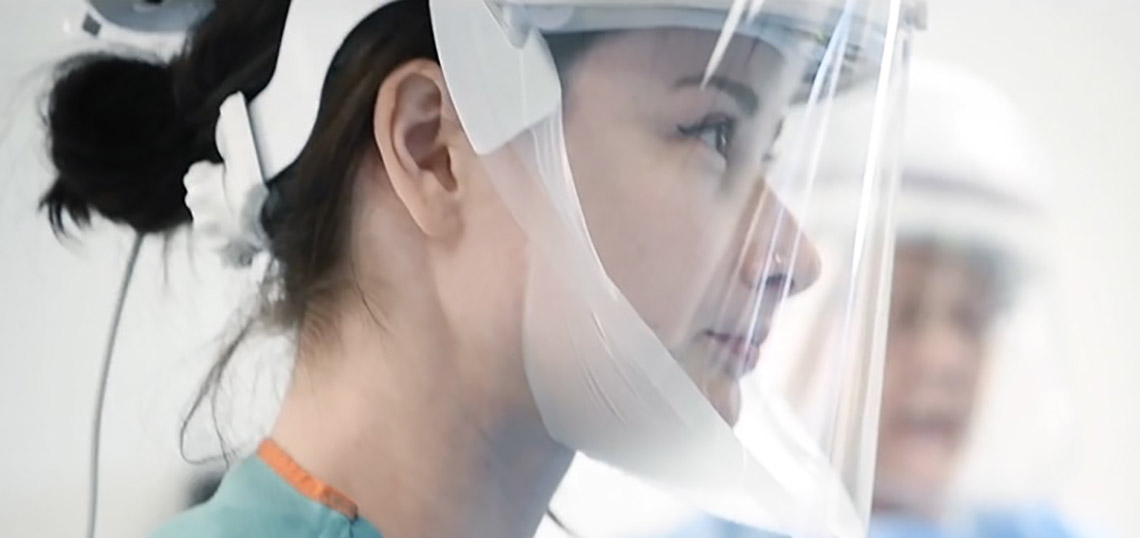Highest level of safety, comfort, convenience and personal care for HCP
DATE February 4, 2020 - Irvine, CA - Although the route of transmission remains to be defined for the 2019-20 coronavirus, the Center for Disease Control and Prevention (CDC) is recommending similar precautions for healthcare workers as it does for other coronaviruses such as, MERS and SARS that have multiple routes of transmission.
According to a nursing guide from the University of Massachusetts, infection control may include contact, droplet and airborne precautions, which cover exposure to the virus via direct and indirect contact with an infected person, transmission through sneezing or coughing, or infectious particles so small they remain suspended in the air for long periods of time.
There are a number of specific actions called for under each of these types of precautions; all of them call for masking the patient, and recommend healthcare providers use gloves, gowns and masks when delivering medically necessary care.
The CDC, however, warns that while a surgical mask protects from large air droplets, like those released when someone sneezes or coughs, smaller airborne particles can be inhaled through the mask and the openings on the side, as such masks are not airtight. When airborne infections are suspected, special masks, such as respirators, are recommended.
While the CDC has not called for such special masking for treating coronavirus patients, should airborne infection be suspected, the CDC says N95 respirators are an effective option as they fit users tightly and filter out 95 percent of all airborne particles, large or small.
OSHA calls for such respirators to be individually selected to fit the wearer's face and to provide a tight seal. A proper seal between the user's face and the respirator forces inhaled air to be pulled through the respirator's filter material and not through gaps between the face and respirator.
However, the FDA cautions that N95 respirators cannot be worn by people with facial hair as a tight seal is not possible. On a more practical level, wearing such close-fitting masks are not comfortable and 100 percent secure in a normal healthcare setting where providers may need to be with a patient for extended periods of time. In addition, the designs often obscure the provider’s face, presenting an alien appearance, which can be upsetting to patients, particularly pediatric patients.
A more comfortable and higher level of filtering efficiency option to N95 masks, is a loose fitting PAPR. These do not require fit testing and, due to their positive pressure design, they un-resistively provide the wearer with filtered air.
The MAXAIR PAPRs provide very wide field of view for the wearer, and are compatible with wearer glasses, contacts, facial hair, etc. “Fog” free lenses are integral to the head and face covers so they do not require added eye protection, and very importantly when dealing with patients, they provide full facial view of the caregiver, allowing for more normal interactions with patients.
The MAXAIR CAPR Systems provide unprecedented overall safety, comfort, convenience, patient friendliness, and cost effectiveness versus mask respirators and conventional powered air-purifying respirators (PAPRs). Refer to the Advantages section under Products to learn more section under Products to learn more about how the CAPR powered air purifying respirators are meeting todays needs and tomorrows expectations for respiratory and contact (fluid) protection. Under Products>Systems, refer to the CAPR Systems section for more product details.
MAXAIR CAPR® Systems are advanced powered air purifying respirator systems that meet OSHA loose fitting (no Fit Testing required) PAPR requirements. MAXAIR Systems are in use in many healthcare settings and laboratories where airborne particulate and contact (fluid) contaminants exist. CAPR Systems facilitate user compliance due to unique comfort and convenience. All MAXAIR Systems are NIOSH approved designs and have become the respirators of choice versus mask and conventional PAPR designs in numerous organizations.
Sources: University of Massachusetts: “Centralized Clinical Placement Online Orientation”; CDC: “NIOSH-Approved N95 Particulate Filtering Facepiece Respirators”; OSHA: “Respiratory Infection Control: Respirators Versus Surgical Masks”; FDA: “Masks and N95 Respirators”



